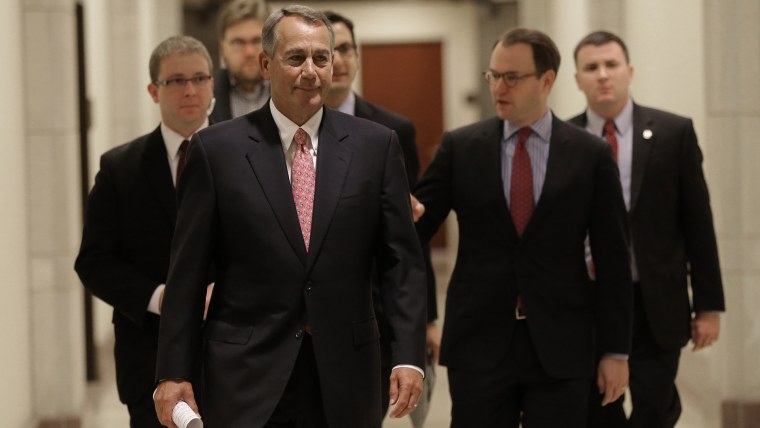The first big fight of the new GOP-controlled Congress began before 2015 even started.
Shortly prior to Christmas recess, Republicans introduced a new change to the House rules that would alter the way the cost of tax legislation is calculated, potentially changing the price tag for one of their biggest priorities in the new Congress. What's more, GOP leaders are reportedly prepared to dump the House’s official scorekeeper to help make it happen — a move that Harry Reid’s spokesman Adam Jentleson warned could turn it “from the impartial referee it's always been into a right-wing ideological organization.”
The GOP’s proposed change, known “dynamic scoring,” is the kind of wonky issue that rarely draws an audience outside of the Beltway, but which Republicans have rallied behind for decades. Typically, the official cost of proposed legislation doesn’t factor in the impact that it would have on the broader economy. The rationale is that broader macroeconomic variables are difficult to predict, and outcomes can vary widely depending on the assumptions made.
Republicans believe that it’s unrealistic and inaccurate to assume that legislation will have no effect on the broader economy — particularly when it comes to the tax cuts that are the GOP’s raison d’être. Tax cuts, they argue, can stimulate broader economic growth and increase revenue — and that should be factored into a proposal’s official cost. Calling it “reality-based scoring,” Rep. Paul Ryan is a major proponent. And dynamic scoring could have an outsized impact on the major tax legislation that he hopes to push as the incoming chair of the House Ways and Means Committee.
Under pressure from conservatives to take up the issue, the GOP has already put dynamic scoring on the fast track for the next Congress: In late December, the House GOP proposed a change to the rules that would require the two budget scorekeepers in Congress — the Congressional Budget Office (CBO) and the Joint Committee on Taxation (JCT) — to incorporate dynamic scoring when estimating the official cost of major tax legislation, according to The Wall Street Journal.
RELATED: Can Wall Street reform survive 2015?
When the JCT used the approach to evaluate outgoing Ways and Means Chair Dave Camp's tax plan, it found it would raise between $50 billion to $700 billion in additional revenue. That could make it easier for Republicans to cut taxes further while claiming such proposals are revenue-neutral, WSJ's David Wessel points out.
Some conservatives are also lining up against the current CBO director, Doug Elmendorf, arguing that his cost estimates for Obamacare are overly rosy and that the office needs a bigger proponent of dynamic scoring. Bloomberg’s Dave Weigel recently reported that Republicans have already decided against reappointing Elmendorf as CBO director, who’s appointed by leaders in both house.
Both moves have alarmed Democrats, who warn that Republicans will try to use dynamic scoring to mask the real cost of tax cuts and other GOP priorities. “Are Republicans trying to cook the books so they can hock tax cuts for the rich as something other than the system-rigging, anti-middle class budget busters they actually are?” Reid’s spokesman Jentleson wrote, shortly after Bloomberg’s report on Elmendorf.
“Imposing ‘dynamic scoring’ on Congress’ scorekeepers isn’t just an accounting issue. It favors windfall tax breaks to the very wealthy and big corporations who can hire high-priced, well-funded lobbyists,” Rep. Chris Van Hollen, the highest ranking Democrat on the Budget Committee, said in a statement. He added: “Republicans are trying to cook the books and hoping Americans won’t notice.”
Not all on the right agree with the GOP’s strategy. Prominent conservatives have risen to defend Elmendorf. “I think he’s done a great job — he deserves credit as being one of the top one or two CBO directors of all time,” says Doug Holtz-Eakin, who served as CBO director in the Bush administration. Others on the right warn Republicans against politicizing an office that’s traditionally been considered a fair, non-partisan scorekeeper.
RELATED: House passes last-minute spending bill over Democratic objections
Republicans have a clear path to implementing both changes: With complete control of Congress, the CBO appointment lies in their hands, and the new requirement for “dynamic scoring” simply needs a majority in the House to pass. Holtz-Eakin himself is a defender of dynamic scoring, calling it a “conceptually important step” that will allow lawmakers to compare competing bills more accurately.
But he also believes that dynamic scoring won’t have as dramatic an impact as both sides believe. He points out that the proposed rule would require only tax or spending bills that have an impact that exceeds 0.25% of GDP, according to the WSJ. That's is a relatively rare occurrence. And most legislation simply doesn’t end up having a sweeping impact on the larger economy, adds Holtz-Eakin, who provided dynamic scoring for some bills during the Bush years. “It doesn’t turn out to be a big number that some on one side wants and the other side fears.”
